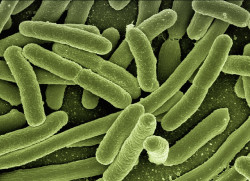Do microbes control our mood?
If aliens were to examine a human, they would think we were just slavish organisms designed to feed microbes and carry them around. Our bodies contain ten times more bacteria than cells, and there are an estimated 3.3 million genes in the total bacteria DNA, which is 160 times the number of human genes. Our intestine hosts about one kilogram of bacteria which help to digest and metabolise food, produce vitamins and protect us from infections. The above is textbook knowledge, but loads of recent studies are uncovering new and unsuspected roles for these little companions. There is evidence that gut bacteria can protect or predispose us to pathologies ranging from inflammation to diabetes and obesity. And, as far-fetching as it sounds, a remarkable amount data shows that they can even modify our mood and behaviour. Microbes are hot on the scientific agenda. In May, the US government launched a National Microbiome Initiative with an overall budget of half a billion dollars, while the EU is funding more than 300 projects related to the microbiome. Yolanda Sanz, a researcher at the Institute of Agrochemistry and Food Technology (IATA) of the Spanish National Research Council in Valencia, Spain, coordinates MyNewGut, the largest EU consortium in the field with 30 partners in 15 Countries. We asked Sanz about the perspectives of research and the intriguing connections between the microbiome and the brain. What makes our gut flora, and how does it change over time? Our intestine hosts a complex ecosystem of bacteria; we call it the gut microbiota, which includes at least 1000 difference species. We get most of our gut microbes soon after birth, although there is evidence of colonisation even during prenatal life. Over the first 2-3 years of life, the microbiota is very unstable in its composition. This condition overlaps with a period in which the immune system is still immature. At this stage, the microbiota is greatly influenced by diet, for example whether you are breastfed or not. When an adult diet takes over, the composition of the gut microbiota becomes more stable and a microbiotic profile emerges. This usually prevails until old age when the diet goes back to being less diverse and more unstable, such as in babies. In some way, the evolution of microbiota reflects our growth and senescence. Do we therefore have a sort of microbial identity, a bacterial fingerprint that is unique to an individual? Yes, each person has a different proportion of bacterial species and strains in his or her gut. If I had to put a figure on it, I would say that about a quarter of the microbiota is unique to each individual, but it’s difficult to give a precise estimate. Also, we know that our genome influences our gut flora. We don’t know how it works, but at least some features of our microbiota are associated with our DNA. What happens when people radically modify their diet? If I became vegan, for example, would it change my microbial identity? Studies show that if you alter your diet dramatically, for instance by changing the proportion of fibres, proteins or fats, you will see relatively quick changes in your microbiota. About 30-40 percent of the bacterial strains will vary in their abundance. In some way, you will get a new microbial identity until you change the diet again. Drugs can also alter the microbiota. Recent studies point to antibiotics, of course, but also to proton pump inhibitors, anti-inflammatory drugs and other classes of medications that do not interact directly with bacteria. The picture is more complicated than what it looked a few years ago. What is the connection between the microbiota, the brain, and mood? There is a growing evidence of a microbial gut-brain axis in which bacteria can influence the brain, and vice versa. Read more at: http://www.youris.com/Health/Immunology/Do-Microbes-Control-Our-Mood.kl(opens in new window)
Countries
Austria, Australia, Belgium, Canada, Germany, Denmark, Spain, France, Ireland, Italy, Netherlands, New Zealand, Serbia, United Kingdom, United States



